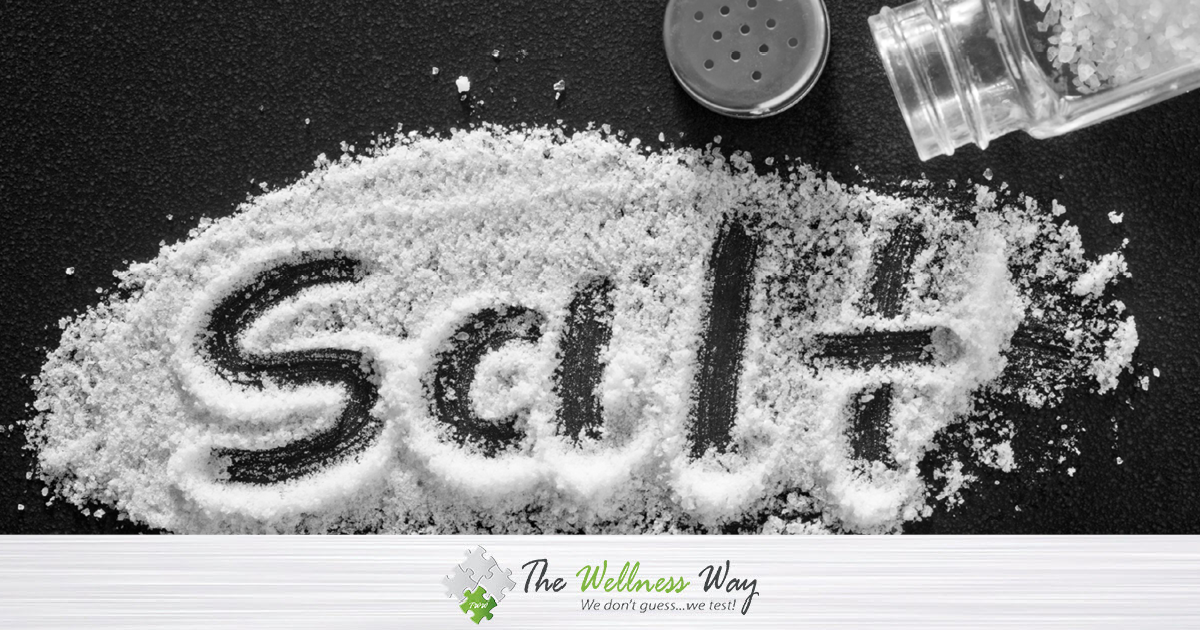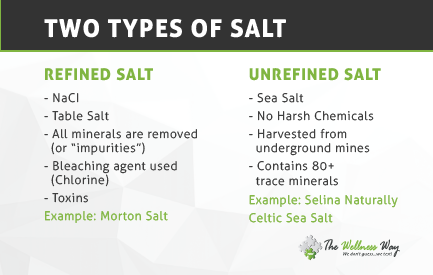It’s Good to Be Salty!
Have you been misled about salt? Have you been told by a medical professional to have a low sodium diet? If you believe what traditional doctors, the World Health Organization, The American Heart Association and governments around the world have been telling people about reducing salt, this will make you salty. They have been telling everyone to cut down on salt. But hold on…Salt can actually be good for you and restricting salt can lead to negative outcomes. Yup, salt is good for you.
Salt is an essential nutrient and the second most essential nutrient next to water. It helps regulate body functions, is critical for cell function, and is important for maintaining fluid balance in the body. You need salt to be healthy.
The myth of salt being bad for you is based on some faulty perspectives on studies, but before we go into that- let’s make sure we are talking about the same salt. Because all foods can be taken, processed and turned into something crappy. You want to look for unrefined salt because we agree that you should not be eating refined table salt.
Comparing Table Salt and Unrefined Salt
Let’s be really clear about what salt we are talking about. We are not talking about table salt being good for you- we are talking about unrefined salt. You shouldn’t be eating table salt at all. Its been processed to remove “impurities.” Impurities are actually important minerals that they turn around and sell to supplement companies.
First of all, they bleach your salt -that’s why it’s white. Think about what that leaves your salt with. Then they add in 3 more toxins, but they don’t tell you this on the label. Your salt will include a toxin that is an anti-caking agent, sodium ferrocyanide, because people hate clumpy salt, but this stuff turns into cyanide when it comes into contact with an acid.
Can you think of any acids in your stomach? The ones that help you break down food? Exactly, but no worries – they “fix” the problem by adding another toxin, ammonium ferric citrate, to keep the first toxin from becoming cyanide.
The third toxin, aluminum silicate, is another anti-clumping toxin that has been linked to cancer, birth defects and other reproductive harm. You may also often find dextrose or MSG which are used to stabilize iodized salts.
With table salt you get sodium chloride and 3 toxins while with unrefined salt you get the “impurities” left in. Let’s keep the impurities! Those impurities are important trace minerals like chromium, zinc, chloride, iron, plus ones that are electrolytes like sodium, magnesium, calcium and potassium that all help your body. It’s not just salt, it’s up to 88 minerals!
So, what does refining mean? Taking out all the good stuff and leaving you with some bad stuff. Is that enough to get you to quit the table salt?
What’s Salt Good For: 6 Benefits
1) Nervous System Function
We need salt for our nervous system to work. Sodium is key to the electrical messages your cells receive and helps your brain communicate with the muscles. Overstimulation of the nervous system causes the body to go into fight or flight mode which is a harmful effect of a low sodium diet.
2) Heart Health
Even though they say to reduce salt intake for cardiovascular health the research doesn’t support that. Low salt intake increases risk of heart attack by 430%. It has also been shown that 27% of patients with sodium levels lower than 135 mmol/L had congestive heart failure. Salt is important for maintaining a healthy heart.
3) Hydrating
You need a good electrolyte balance to absorb water. Electrolytes like sodium, magnesium, calcium and potassium that are found in unrefined salts. If you don’t have a good electrolyte balance your body can’t hold onto the water.
4) Stomach Acid Production
Do you want to avoid heartburn, acid reflux, and bloating? You need stomach acid! For adequate stomach acid production, you need salt! Chloride helps with stomach acid production and the best source of that is good, unrefined salt.
5) Supports Adrenal Glands
A good salt can nourish your adrenals because of its mineral content. When the intake of unrefined salt is restricted it will cause renin-angiotensin-aldosterone system cascade (RAAS CASCADE) that throws off the balance of hormones. If your adrenals are stressed, you will lose more sodium which increases the need for sodium in the diet.
6) Maintaining Insulin Levels
When your body is low in sodium it needs to hold onto salt. one of the ways it helps your kidneys do that is to raise insulin levels which leads to insulin resistance. Insulin resistance, or metabolic disease, increases your risk of diabetes, obesity, hypertension and stroke. A low salt diet activates the renin-angiotensin-aldosterone system and the sympathetic nervous system, which can both lead to insulin resistance. (1)
All the Benefits Why the Bad Rep?
It seems our government and health organizations are willing to push for low salt diets despite much evidence and research showing that salt does not cause hypertension in Caucasians with normal renal function. There is also much evidence of the many benefits of salt. Despite the fact that low salt diets can actually cause much harm when pushed for the whole population (2). Salt benefits every tissue and organ!
The myth that we need to reduce the salt intake for all is based on the INTERSALT Study. It looked at 52 countries and 39 population centers. Of the 39 population centers, 4 population centers had significantly lower salt in their diet and their blood pressure did not increase with age.
So, researchers thought that lower salt intake must mean lower blood pressure. But let’s take a closer look. Those 4 population centers were the Yanomamo Indians, a Xingu Tribe, a Kenyan Tribe and a tribe from Papua, New Guinea. They had low salt intake but were also jungle cultures with no alcohol intake, low obesity and only lived into their early 50’s.
How do you think tribal jungle life compares to the American lifestyle? There were many factors of their lifestyle that were very different from the average American lifestyle that could contribute to their lower blood pressure. When compared to similar lifestyles the amount of salt made no or little impact on blood pressure and when looking at all 52 population centers an increase in salt consumption did not correlate with an increase in blood pressure. (3)
The study, along with others, were used to support limiting salt intake in all populations, even those who would not benefit from the reduction.
Restricting Salt has Negative Outcomes: 5 Negative Outcomes
1) Loss of nutrients
Low sodium intake increases aldosterone. Aldosterone is essential for sodiumconservation in the kidney, salivary glands, sweat glands and colon. Increased aldosterone as a result of restricting unrefined salt causes you body to hold on to more salt but at the same time you lose potassium, magnesium and calcium. Your body needs those for healthy function!
2) Inflammation
It’s very inflammatory for the body to release aldosterone. The low sodium diet that is recommended by the medical community directly causes a 320% increase in aldosterone levels. Aldosterone causes tissue inflammation and scarring leading to damage in your blood vessels, heart, and kidneys. (4)
3) Decreased thyroid function
Restricting unrefined salt intake can lead to stress on the adrenal glands and impacts the thyroid function because you aren’t getting the necessary minerals for proper function.
4) Alzheimer’s and dementia
Restricting your salt intake also throws off the cellular osmosis which can cause swelling, or inflammation, of the brain. Restricted salt intake has been linked to mental illness and dementia. Who do we most pressure to be on a low salt diet? The elderly.
5) Increased Mortality
A study looked at over 130,000 people from 49 countries and found that a low salt diet may increase the risk of heart disease and death. This was the same for both those with and without high blood pressure. (2) This makes it even more unclear why everyone is being pushed to a low sodium diet.
Symptoms of low salt:
- Dizziness or recent fall
- Lethargy
- Fatigue
- Issues with metabolism
- Thyroid
- Cardiovascular issues
- Adrenal Concerns
- Kidney Stones
- Brain Fog
- High Blood Pressure
- Cellulite
- Blood Pressure Concerns
- Water retention
- Diabetes or insulin resistance
Shopping for Salt:
If you have any of those symptoms, and even if you don’t, you are probably adding salt to your shopping list right now. You are probably used to buying the blue can with the little girl in the yellow rain coat holding the umbrella. It’s been on the counter for years and you haven’t thought too much about buying salt. Here’s what you need to look for.
- Check the label- it should say unrefined. All salt at one time came from the sea so they can all say they are sea salt. Don’t assume sea salt is the one you are looking for. You want unrefined to know it hasn’t been bleached and “purified” of all those great minerals.
- Buy smaller bags because there is moisture and you don’t want the moisture evaporating and taking any minerals with it. Store in a cool, dry place to further prevent evaporation.
- Pink Himalayan is a good option and is less likely to need any processing.
- Celtic Sea Salt is a good option because it is a lower cost point compared to Himalayan.
- Make sure they do not use metal grinders. Selina Naturally Celtic Sea Salt is our preferred choice of Celtic Sea Salts.
- It should be very granular with various sizes
- Sea Salt should not be white! It should be grey otherwise it’s been bleached.
Get Salty!
You should be salty now that you know how much we have been lied to about salt. Because a percentage of the population is sensitive to salt there has been a spreading of detrimental advice that causes negative health outcomes. How do you reverse or prevent the dangers of a low salt diet? Get adequate, unrefined salt intake. Add salt and flavor to your life by bringing 5-10 grams of unrefined salt into your diet daily. Yes, DAILY!! That’s 1-2 teaspoons. That may seem like a lot, but you need it.
If you are experiencing any of the symptoms get tested to find out exactly how much salt your body needs to get back into balance. The primary reasons for low sodium levels are low intake and overhydration. Always choose the unrefined salt without the toxins. Don’t forget- It’s good to be salty.
Did you learn something new that will change your life? Learn More With Dr. Andrew!
Resources
(1) https://www.ncbi.nlm.nih.gov/pubmed/21036373
(3) https://www.scientificamerican.com/article/its-time-to-end-the-war-on-salt/


